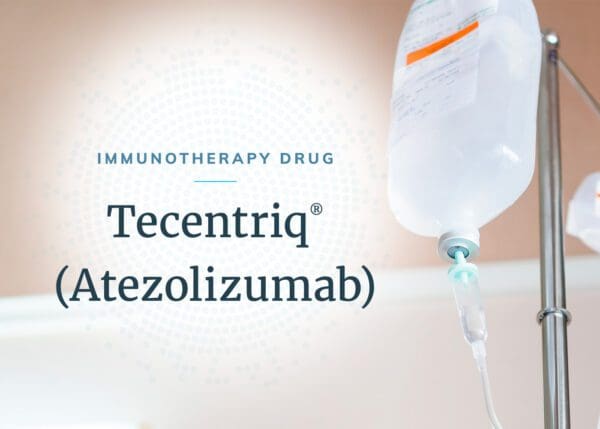01. What Is Tecentriq?
What Is Tecentriq (Atezolizumab)?
Tecentriq® (atezolizumab) is an immunotherapy drug that treats cancer. Like other immunotherapies, it is sometimes combined with additional mesothelioma treatments. Such treatment combinations include Tecentriq with Avastin® (bevacizumab), carboplatin, cisplatin or Alimta® (pemetrexed).
Immunotherapy is a standard treatment method for many cancers, including mesothelioma. Research and related developments are ongoing for these drugs. The U.S. Food and Drug Administration (FDA) has approved Tecentriq to treat some cancer types. Future clinical testing may suggest Tecentriq can also safely and effectively treat mesothelioma cancer. Until then, Tecentriq’s value for mesothelioma remains unknown.
Recently, researchers have conducted some clinical trials on mesothelioma and Tecentriq. Interested mesothelioma patients may be eligible to take part in future Tecentriq clinical trials.
02. Tecentriq and Mesothelioma
How Does Tecentriq (Atezolizumab) Treat Mesothelioma?
Tecentriq is a type of immunotherapy drug called an immune checkpoint inhibitor. Immune checkpoints are parts of the immune system that help protect healthy cells. These checkpoints identify which cells the immune system should not attack.
Cancer cells can manipulate this checkpoint system to protect themselves from attack. Tecentriq and other inhibitors block these checkpoints. This helps immune cells identify and attack malignant tumor cells. This includes less common types of tumors, such as mesothelioma.
So far, doctors and researchers have used Tecentriq as part of multimodal treatment plans. This means Tecentriq is used in combination with other treatment methods or drugs. Some cancer patients receive Tecentriq with chemotherapy drugs, such as Alimta and cisplatin. Researchers have also looked at Tecentriq administered after cytoreductive surgery (CRS) and heated intraperitoneal chemotherapy (HIPEC).
Tecentriq is not yet approved for treating mesothelioma. However, the drug recently received approval for treating cancers that can be asbestos-related. These cancers include:
- Non-small cell lung cancer (NSCLC)
- Small cell lung cancer (SCLC)
Tecentriq also has approval for treating alveolar soft part sarcoma, hepatocellular carcinoma, melanoma and urothelial carcinoma. Researchers continue to study the efficacy and safety of treating mesothelioma with Tecentriq.
Tecentriq (Atezolizumab) for Asbestos-Related Lung Cancer
Tecentriq has FDA approval for use in the treatment of NSCLC and SCLC. The indications for treating lung cancers with Tecentriq differ between the two types.
- NSCLC: Tecentriq can be used as a first- or second-line treatment. This means patients may receive it as part of their primary treatments or after a primary treatment stops working. Tecentriq has FDA approval to be used alone or when combined with bevacizumab, paclitaxel or carboplatin.
- SCLC: Tecentriq can be used as a first-line treatment when combined with carboplatin and etoposide.
The drug label includes eligibility factors for different Tecentriq regimens. Patients interested in Tecentriq can discuss these factors with their oncologists. Doctors can explain which regimens – if any – may make sense.
Research links some lung cancer cases to asbestos exposure. Asbestos fibers can also cause mesothelioma and other cancers. People diagnosed with asbestos-linked lung cancers may find this treatment option helpful.
Resources for Mesothelioma Patients
03. What to Expect
What to Expect During Treatment
Tecentriq is an intravenous drug that may be a first- or second-line treatment for certain cancers. Dosage amounts or administration schedules for mesothelioma patients have not yet been approved. However, Tecentriq dosage guidelines for patients with lung cancer are available.
During the first treatment, doctors give the patient an intravenous dose through a 60-minute infusion. If the initial dose is well-tolerated, the patient may receive a second infusion weeks later. Second and later doses may occur in 30-minute infusions.
As a supplemental treatment for NSCLC, doctors may use the following regimens:
- 840 mg dose, every 2 weeks
- 1200 mg dose, every 3 weeks
- 1680 mg dose, every 4 weeks
Patients with lung cancer may continue Tecentriq treatment for up to one year. Some patients may also receive chemotherapy with bevacizumab in combination with Tecentriq. Throughout treatment, doctors may monitor patients with routine tests. This can help doctors watch for and address patient reactions or discomfort.
Tecentriq Treatment Procedure in a Mesothelioma Study
Initial studies have been conducted on treating mesothelioma with Tecentriq. In one study, researchers administered treatment through four cycles, each lasting 21 days. Doctors stopped treatment if the patient experienced severe side effects or tumor progression.
On Day 1 of the cycle, doctors intravenously administered:
- Tecentriq over a period of 30 to 60 minutes
- Alimta over a period of 10 minutes
- Cisplatin over a period of 2 hours
Patients later underwent various types of surgery. Those undergoing extrapleural pneumonectomy (EPP) also received radiation therapy after surgery. Following surgery and radiation, patients could continue Tecentriq therapy for up to one year.
Patients with lung cancer or mesothelioma who receive Tecentriq may experience side effects. Oncologists can help patients track and manage these as they occur.
Preparing for Your Appointment
Before beginning Tecentriq infusions, patients may want to plan ahead for comfort. Unlike some other treatments, such as chemotherapy, medical preparations are generally not needed. But patients may want to take steps to improve their experience during infusion treatments.
Patients may choose to prepare by:
- Bringing a blanket for warmth
- Dressing comfortably
- Packing a book, magazine or other entertainment
- Planning to bring a companion for company and support
- Preparing doctor-approved snacks or drinks
- Taking notes about the experience and any questions or thoughts
Patients may also want to find someone to drive them to and from their appointments. Doctors or cancer centers may recommend this until they know how a treatment will affect a patient.
If a patient has any questions leading up to their treatment, they should talk with their mesothelioma doctor. A patient’s healthcare team may also have other suggestions to offer.
04. Benefits of Tecentriq
Tecentriq (Atezolizumab) Benefits
Researchers continue studying the benefits of Tecentriq for treating mesothelioma. This includes research on overall survival rates for mesothelioma patients receiving Tecentriq.
One clinical study for pleural mesothelioma projected median survival may exceed 20 months.
Another study treated inoperable peritoneal mesothelioma patients with Tecentriq and Avastin. Researchers reported a 1-year survival rate of 85%.
Mesothelioma patients may experience other general benefits with Tecentriq, such as:
- Fewer immune-related side effects. Tecentriq is a PD-1/PD-L1 targeting checkpoint inhibitor. Compared to CTLA-4-targeting inhibitors, such as Yervoy® (ipilimumab), Tecentriq may have fewer immune-related adverse effects.
- No required pretreatment preparation for checkpoint inhibitor treatment. In contrast, chemotherapy and other treatments may have detailed patient preparations.
- No surgery to implant a port. Unlike some chemotherapies, a port is not needed for patients to receive checkpoint inhibitor therapy.
05. Side Effects of Tecentriq
Tecentriq (Atezolizumab) Side Effects
Like many drugs and cancer treatments, Tecentriq has various potential side effects and warnings for its use. Healthcare providers can explain side effects in detail and tell patients what to watch for.
Researchers are continuing to study the side effects of Tecentriq. They are working to find which side effects occur in mesothelioma patients.
Less common side effects include infusion reactions. Tecentriq may also lead to autoimmune reactions in which immune cells attack healthy tissue.
In one study, some peritoneal mesothelioma patients receiving Tecentriq experienced other side effects. These included anemia and increased blood pressure.
Patients should tell their doctor about any discomfort they experience during or after treatment. Their doctor can then choose the best way to handle the side effects of Tecentriq treatment.
Managing Side Effects
Some patients may experience side effects from their Tecentriq treatment. Based on the type and severity of the reactions, doctors may choose to do any combination of the following:
- Administer corticosteroids
- Administer other immune-suppressing drugs (immunosuppressants)
- Pause treatment
- Stop treatment permanently
Side effects can vary based on several factors, including other treatments. For instance, side effects may be different if doctors combine Tecentriq with chemotherapy. Doctors may consider this when managing side effects caused by Tecentriq.
06. Tecentriq Eligibility
Who Is Eligible for Tecentriq (Atezolizumab)?
In 2016, the FDA approved Tecentriq for certain types of cancers. Detailed information about eligibility for treatment of these cancers is available in the drug label. At this time, Tecentriq is not approved to treat mesothelioma. Still, some patients may qualify to access the drug through clinical trials.
Researchers are studying Tecentriq for malignant pleural mesothelioma (for both epithelioid and biphasic cell types) and peritoneal mesothelioma. Patients interested in Tecentriq should ask their doctor about any active clinical trials. They can discuss eligibility requirements and other participation details.
07. Tecentriq Studies
Clinical Trials and Studies on Tecentriq (Atezolizumab) for Peritoneal and Pleural Mesothelioma
Various studies about mesothelioma and Tecentriq have been conducted in recent years. Some early findings seem promising. Researchers have projected the median survival for pleural mesothelioma patients treated with Tecentriq and other treatments will be longer than 20 months.
Researchers shared early results from two Tecentriq mesothelioma studies in 2021. One trial studied pleural mesothelioma and the other trial studied peritoneal mesothelioma.
These clinical trials demonstrate the potential of Tecentriq treatment for patients with mesothelioma. Doctors can help interested patients find clinical trials they may qualify for. Many cancer centers take part in open-label trials. This means that researchers and participants know which treatment is being given. These cancer centers may be able to connect patients with researchers.
Some mesothelioma doctors specialize in immunotherapy drugs. Mesothelioma immunotherapies include Opdivo® (nivolumab), Yervoy® (ipilimumab), Keytruda® (pembrolizumab) and CAR T cell therapy. Oncologists can explain the best treatment options for each individual patient.












